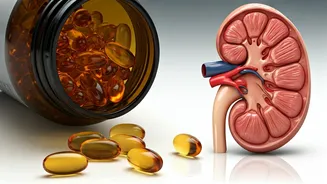Vitamin D & Kidneys
Vitamin D, crucial for bone health and overall well-being, is often hailed for its benefits. However, a nephrologist from Chennai has cautioned against
the pitfalls of excessive intake, particularly concerning kidney health. The kidneys play a vital role in filtering blood and regulating mineral balance. An overdose of vitamin D can lead to a buildup of calcium in the blood, a condition known as hypercalcemia. This surplus of calcium can wreak havoc on the kidneys, potentially leading to damage, kidney stones, and even kidney failure. This underscores the need for a balanced approach and adherence to medical advice regarding vitamin D supplementation.
6 Symptoms to Note
Recognizing the signs of vitamin D overdose is crucial for timely intervention. The Chennai nephrologist has highlighted six key symptoms to watch for. Firstly, increased thirst and frequent urination are common indicators as the kidneys struggle to process excess calcium. Secondly, nausea and vomiting can occur due to elevated calcium levels affecting the digestive system. Thirdly, muscle weakness and bone pain may arise as the body attempts to manage the mineral imbalance. Fourthly, confusion and cognitive difficulties can surface as hypercalcemia impacts brain function. Fifthly, loss of appetite can be a warning sign. Finally, in severe cases, heart problems such as irregular heartbeats might develop. Prompt recognition and consultation with a healthcare professional are vital to prevent long-term complications.
Dosage & Awareness
Understanding the appropriate dosage of vitamin D is essential to avoid health risks. The amount of vitamin D needed varies from person to person, contingent on age, health conditions, and lifestyle. Self-medication or excessive intake without medical supervision can be detrimental. Healthcare providers typically recommend blood tests to assess vitamin D levels and prescribe supplements accordingly. The article emphasizes the importance of consulting a healthcare provider before taking any vitamin D supplements. Being aware of the source of vitamin D, be it through sunlight exposure, dietary intake, or supplements, helps in monitoring and regulating the intake. Awareness allows individuals to make informed decisions about their health.
Seeking Medical Advice
When suspecting a vitamin D overdose, immediate medical attention is necessary. Consulting a nephrologist or a general physician can provide clarity and guidance. The healthcare provider will likely perform a thorough physical examination, review medical history, and order blood tests to assess vitamin D and calcium levels. Treatment often involves ceasing vitamin D supplementation and focusing on rehydration to help flush out excess calcium. In more severe situations, medications or interventions such as intravenous fluids or dialysis might be necessary to restore kidney function. Follow-up appointments and regular monitoring are crucial to track progress and prevent future complications. Adhering to the doctor's instructions remains key to safeguarding kidney health.



















